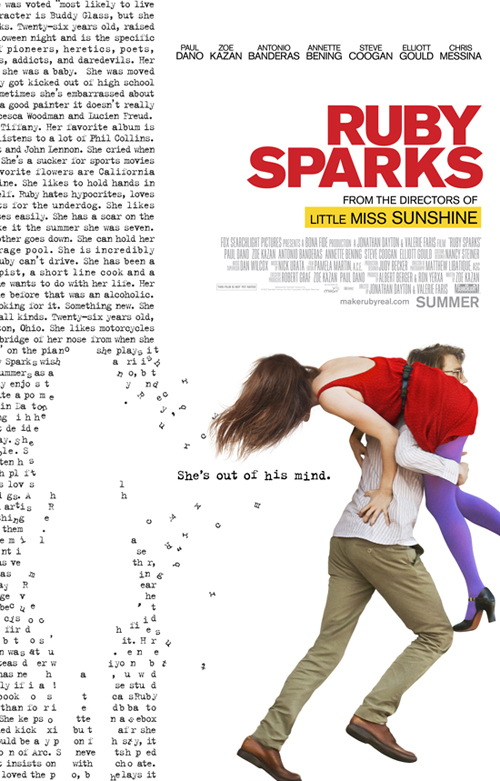

Director: Jonathan Dayton, Valerie Faris, 2012 (R)
How often do those of us in a relationship wish we could
change the other person? Perhaps it is the quirky habit that seemed so cute
when dating but now seems so irritating. Calvin (Paul Dano, There will be Blood) gets the chance to
do just this, in the indie romantic comedy.
Calvin is a young Californian novelist whose first novel, written while in his
teens, was a huge bestseller. But he cannot come up with a second novel. He
spends his days in front of his typewriter staring at the blank sheet, living
on his past reputation, and dreaming of a girlfriend. He literally dreams of a
girl called Ruby Sparks from Dayton, Ohio. But when she magically appears one
day in his apartment, exactly as he envisaged her, he is confronted with his own
creation.
It takes him a little while to believe she is real. But it
is his brother Harry (Chris Messina) who tells him to rewrite his story,
changing her in the lines on paper. When he does, she changes in “real-life”.
And right then, Calvin realizes he has the power to change his girlfriend in
any way he wants.
The film brings other characters in, although most don’t
really add much to the plot. Elliot Gould has a few scenes as Calvin’s shrink,
mostly to allow Calvin to verballuy process what he is going through. Annete
Benning and Antonio Banderas play Calvin’s mom and step-dad, an earthy couple
who have embraced the post-hippy organic lifestyle. But this is Zoe Kazan’s film
as Ruby and it is her chemistry with Dano that makes this interesting.
 In fact, it is Kazan’s film in more ways than one. She not
only stars here, but she wrote the screenplay and produced the picture. Her diverse
pedigree is unsurprising, since her grandfather Elia Kazan directed On the Waterfront, her mother Robin
Swicord wrote the screenplay for The Curious Case of Benjamin Button and her father Nicholas Kazan wrote the
screenplay for Fallen and Reversal of Fortune.
In fact, it is Kazan’s film in more ways than one. She not
only stars here, but she wrote the screenplay and produced the picture. Her diverse
pedigree is unsurprising, since her grandfather Elia Kazan directed On the Waterfront, her mother Robin
Swicord wrote the screenplay for The Curious Case of Benjamin Button and her father Nicholas Kazan wrote the
screenplay for Fallen and Reversal of Fortune.
As the relationship between Calvin and Ruby develops,
Calving falls into his old ways of withdrawing to be alone and reading. But
Ruby wants more. She is now a real live, red-blooded woman, and she craves
companionship and communication. She wants more from Calvin than he wants to
give. And she has moods, which affect Calvin. So, he begins to rewrite her,
changing her to what he wants regardless of what she desires. He acts like God,
but in a selfish way. He seeks control.
Herein lie the key question at the heart of Ruby Sparks. Can we change or even
control our partners? Moreover, what are the consequences of such attempts and
how much free will is involved in the relationship?
Most of us come to relationships with an ideal in mind. For
Calvin, it was Ruby. For us, it may be something entirely different. But our
uniqueness makes us create a unique ideal, which no one can possibly fit or
fulfill. But we somehow think our boyfriend or girlfriend, or our spouse, will
be that person. When reality rocks that picture, we face one of two options:
acceptance or control. If we try to control the relationship, we are actually
trying to do what Calvin did: play God by changing our partner. This rarely
works. Relationships are built on trust and respect, not control. If love is at
the heart of the relationship, love finds a way to accept. As the Bible says,
love “is not self-seeking, it is not easily angered, it keeps no record of
wrongs” (1 Cor. 13: 5).
Even though in the magical realism of the film Calvin could
actually change Ruby, in reality we cannot change another person. The only
person we can really and truly change is ourself. And when we do change
ourselves, we often find that we look upon our partners differently. We become more
accepting and the things we wanted changed in them, no longer bother us as
much.
Copyright ©2013, Martin Baggs


No comments:
Post a Comment